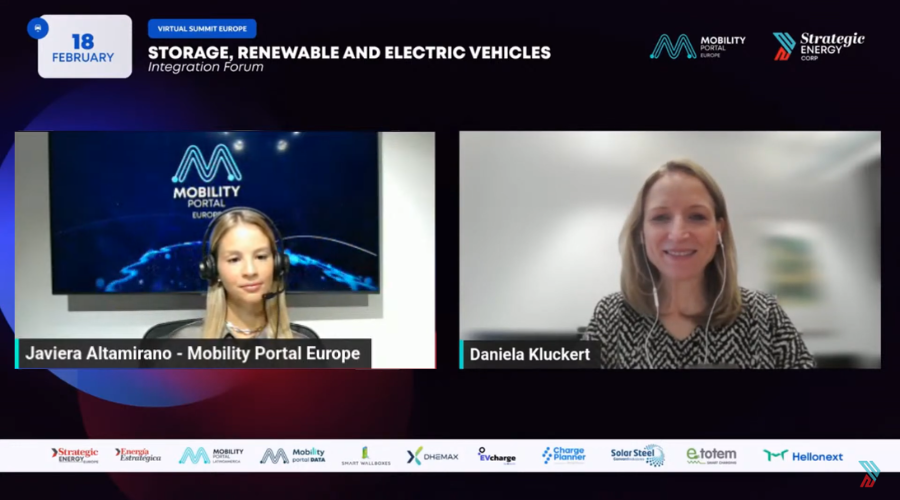Drawing from her experience as former Parliamentary State Secretary at the Ministry for Digitalisation and Transport, Daniela Kluckert makes it clear what is essential for accelerating eMobility.
“I am convinced that an economy which is driven by state subsidies is a wrong approach,” she asserts at the “Storage, Renewable, and Electric Vehicles Integration Forum”, organised by Strategic Energy Corp.

Nevertheless, she does not dismiss the idea that, in the early stages of an emerging technology, such financial support may be appropriate.
“But as soon as a technology has gained a foothold on the market, it must establish itself, and electric mobility is capable of achieving this,” she states.
It is worth noting that Germany offered an environmental bonus until December 2023—an incentive designed to promote electric vehicle (EV) purchases.
Following its abrupt removal, EV registrations saw a significant decline in 2024, though they have gradually recovered over the course of this year.
What alternative solution does she propose to accelerate the transition?
“It makes more sense than subsidies to ensure that eMobility is practical in everyday life,” she emphasises.
This entails a strategically distributed charging infrastructure, as well as a seamless operation and payment process at charging stations, aiming to make the experience as convenient as refuelling a conventional vehicle.
The government consistently promotes the development of charging infrastructure for both electric cars and lorries through various programmes and public tenders.
One initiative highlighted by the Member of the German Federal Parliament is the Deutschlandnetz, a project spearheaded by the federal government to ensure a comprehensive, user-friendly fast-charging network tailored to actual demand.
This scheme includes more than 1,000 locations with approximately 9,000 rapid charging points, designed to fill the remaining “white spots” on the charging infrastructure map.
“Its goal is not only to cover these gaps but also to interconnect the entire country,” Kluckert explains.
She further stresses: “Now, you can drive wherever you want, from wherever you are.”
In this context, Kluckert asserts that the expansion of charging infrastructure should be primarily led by the private sector, while the government’s role should be to establish an appropriate regulatory framework, “particularly by accelerating approval procedures.”
“The state should only intervene in regions where network expansion is not economically viable,” she underscores.
And that is not all.
She also advocates for incentivising the development of solutions such as car parks equipped with photovoltaic systems and bidirectional charging, which would enable EVs to be powered directly by renewable energy.
Which German eMobility strategies could be replicated abroad?
Kluckert notes that Germany’s approach is based on close collaboration with the private sector and the use of digital tools to enhance decision-making.
“During my tenure as Parliamentary State Secretary, we established an interministerial working group with the Federal Ministry for Economic Affairs to address the challenges of our charging network,” she recalls.
She also highlights the significance of the National Centre for Charging Infrastructure, which develops digital tools to facilitate the expansion of the charging system.
“My recommendation is to focus on delivering top-tier charging infrastructure and to do so by enabling all stakeholders to fulfil their roles,” she advises.
How can private sector interests be balanced with climate objectives?
According to the expert, the European Union’s climate targets must be met in the most cost-effective manner possible.
“We want to establish the EU Emissions Trading System as the cornerstone of climate policy,” she affirms.
In this regard, she believes that any additional regulations that do not have a tangible impact on emission reduction should be repealed.
From her perspective, it is crucial that European industry remains globally competitive.
“To meet the Paris Agreement’s climate targets and ensure fair competition for European businesses, we advocate for an international emissions trading system with a global carbon price,” she explains.
However, she calls for a more holistic approach to electric mobility.
“In the future, we must not focus solely on the technology itself but rather on its real impact on climate change,” she remarks.
And she adds: “The key is not merely to have eMobility, but to achieve carbon-free mobility.”
Within this framework, legislation mandates that car manufacturers reduce fleet emissions by 15% by 2025 compared to 2021 levels.
Currently, many European automakers consider this target unattainable.
“We should discard the fleet emission targets of the EU. The industry needs more flexibility,” Kluckert insists.
For her, investment in innovative technologies that safeguard both the climate and employment is essential.
“We want electric mobility, climate-neutral fuels, and hydrogen to be treated equitably in terms of regulation, taxation, and funding,” she clarifies.
In this respect, she suggests that the EU adopt a more technology-neutral approach, allowing manufacturers to explore various solutions to mitigate environmental impact without compromising the sector’s economic stability.
The appeal to Germany’s next government
With the federal elections imminent this Sunday, Kluckert warns that the incoming administration must prioritise economic recovery.
“Germany is facing its worst recession since the post-war era, with two consecutive years of economic contraction,” she reports.
And she highlights: “We absolutely need to improve our business location conditions.”
This involves reducing bureaucracy, implementing tax relief, lowering energy costs, maintaining and expanding infrastructure, introducing more flexible labour laws, and ensuring an efficient digital administration.
“Electric mobility remains an important topic,” she says.
And she concludes: “Germany wants to remain a pioneer in all these crucial fields, but to achieve this, a policy framework that fosters growth and innovation is essential.”








